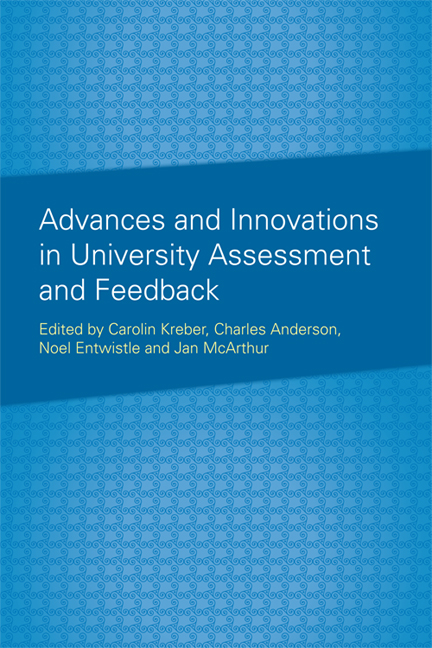Book contents
- Frontmatter
- Contents
- List of Tables and Figures
- Acknowledgements
- Foreword
- Introduction
- Part A Changing Perspectives on the Nature and Purposes of Assessment
- Part B Students' Perceptions of Assessment and Feedback
- Part C Reconceptualising Important Facets of Assessment
- 7 Only Connect? Communicating Meaning through Feedback
- 8 Learning from Assessment Events: The Role of Goal Knowledge
- 9 The Learning–Feedback–Assessment Triumvirate: Reconsidering Failure in Pursuit of Social Justice
- Part D Innovations in Assessment Practices
- Notes on the Contributors
- Index
9 - The Learning–Feedback–Assessment Triumvirate: Reconsidering Failure in Pursuit of Social Justice
from Part C - Reconceptualising Important Facets of Assessment
Published online by Cambridge University Press: 05 August 2016
- Frontmatter
- Contents
- List of Tables and Figures
- Acknowledgements
- Foreword
- Introduction
- Part A Changing Perspectives on the Nature and Purposes of Assessment
- Part B Students' Perceptions of Assessment and Feedback
- Part C Reconceptualising Important Facets of Assessment
- 7 Only Connect? Communicating Meaning through Feedback
- 8 Learning from Assessment Events: The Role of Goal Knowledge
- 9 The Learning–Feedback–Assessment Triumvirate: Reconsidering Failure in Pursuit of Social Justice
- Part D Innovations in Assessment Practices
- Notes on the Contributors
- Index
Summary
Introduction
In doctoral education it is the norm to emphasise that a student must make an original contribution to their subject area. Also commonplace at that level is an approach to learning based on an iterative process of exploring, trying out ideas, trying again, critiquing and correcting work along the way. In other words, at the doctoral level – the highest level of formal education – we allow students to fail and try again as a natural part of the process towards making their own original contribution.
In this chapter I argue that both of these aspects of doctoral education are also relevant to all other levels of higher education. Further, I suggest that making this connection has social justice implications, in terms of both an individual student's learning experience and the broader nature of knowledge engaged with in higher education. I then propose a further link, based on the work of Dai Hounsell, which suggests that a reconceptualisation of failure as part of an educational process is key to achieving the triumvirate of learning– feedback–assessment that marks Dai's significant contribution to higher education scholarship.
I propose a reconsideration of failure in two ways. First, in terms of the stigma attached to failure by current assessment procedures and the underlying pedagogical assumptions behind them. I argue that it is rare when engaging with the complex knowledge that should define higher education to grasp it fully, correctly or critically first time around. We should have systems of assessment that reflect this and approaches to student learning that encourage greater individual agency when dealing with moments of apparent failure. Second, from a critical theory perspective, I consider failure in terms of that which does not meet the expected or accepted norms. To what extent are our assessment practices based on students telling us, or doing for us, what we expect them to do? There is a lot of discussion about critical thinking, critical analysis and critical literacy in higher education, but just how critical do we allow students to be, especially when governed by our assessment systems?
My own exploration of the relationship between conceptions of failure and achieving the learning–feedback–assessment triumvirate is grounded within critical theory and critical pedagogy, and much of the discussion in this chapter draws on the work of early critical theorist, Theodor Adorno (for example, Adorno 1973, 2005a, 2005b).
- Type
- Chapter
- Information
- Advances and Innovations in University Assessment and Feedback , pp. 173 - 194Publisher: Edinburgh University PressPrint publication year: 2014



